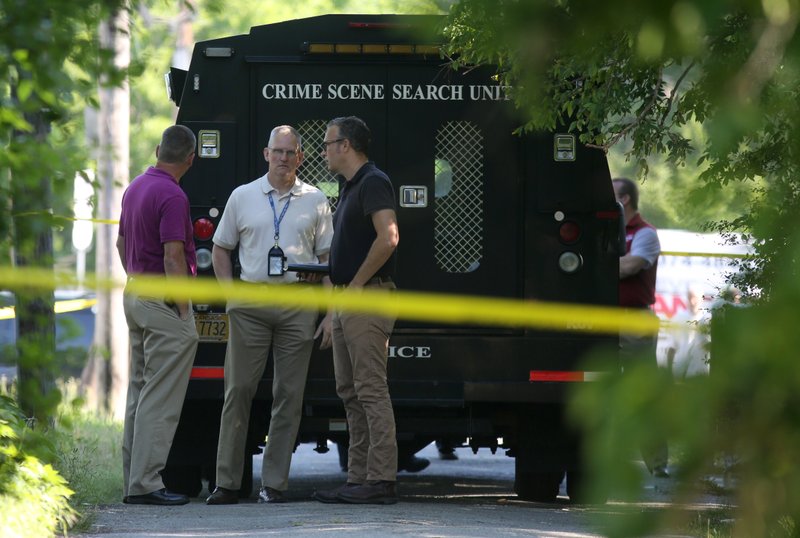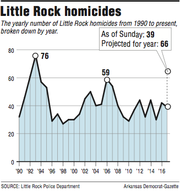Little Rock is on track to end the year with the highest number of homicides in more than two decades, according to police data.
The climbing homicide count comes as Little Rock has seen a surge of overall violent crime, a trend accented by a mass shooting at a downtown nightclub that left 28 injured and led to the creation of an FBI-led task force aimed at targeting Little Rock gangs.
As of Sunday afternoon, the city had recorded 41 homicides, compared with 19 homicides recorded in the same time period last year, and just one shy of the total for all of last year.
"We've got to stop this madness. It's just ridiculous. It's unnecessary. It's out of control," longtime community activist Benny Johnson said last week while standing down the street from the scene of a Little Rock homicide in which a man was killed during a home invasion.
[HOMICIDE MAP: Interactive map of killings in Little Rock, North Little Rock this year]
If the homicides continue at the same rate, Little Rock will see 66 killings by the end of the year. It would be the highest yearly homicide figure since 1993, when Little Rock saw a record 76 homicides as the city dealt with gang violence. Gang activity also attracted national attention after the 1994 release of the HBO documentary Gang War: Bangin' in Little Rock, which explored gang culture in Arkansas' capital city.
If Little Rock reaches 66 homicides this year, it would likely be the second-highest number of homicides in the city's recorded history.
Available Little Rock police data track homicides going back to 1990, according to department spokesman Lt. Steve McClanahan. Before 1990, the department has available data on the yearly number of murders, which, unlike recent homicide numbers, do not include fatal officer-involved shootings or justifiable homicides, he said.
Police data from 1960-89 show that the number of murders in Little Rock ranged from a low of nine in 1964 to a high of 48 in 1989.
"There's no way that number would go above [66]," he said of the 1989 murder count.
There were no homicides this June, a respite bookended by two bloody months -- with seven homicides in May and another 10 in July. In particular, July was among the deadliest months in recent Little Rock history. There have only been three other months in which police logged 10 or more homicides since 1990, department data show.
Authorities have reported nine homicides in the past three weeks, including the killings of a 14-year-old boy, an Italian tourist and a homeless man found dead near a Little Rock alley.
Homicides are often not random, McClanahan said, but it's difficult for police to predict when and where they will occur.
"We're just not able to stop this increase in homicides for whatever reason. And I don't know why," he said, mentioning that gang violence is not the driving force behind the uptick in homicides.
Yet he said gang violence is a factor in an increase in overall violent crime, particularly shootings and incidents of gunfire hitting homes and cars. There have been 2,037 incidents of violent crime -- homicide, rape, robbery and aggravated assault -- as of July 31, a 19 percent increase over the same time period last year, according to preliminary Police Department data.
There are 21 unsolved homicides so far this year, according to the department.
A COMMUNITY GRIEVES
In late July, at an apartment complex in southwest Little Rock, a young boy weaved through the crowd to place flowers on a makeshift memorial for Evilio Castro-Alverez.
Dozens of people formed a half-circle around the memorial in an apartment complex on Baseline Road, the same property where Castro-Alverez lived, worked and ultimately died. Police believe the 55-year-old man was killed during a robbery on July 29, and witnesses told authorities they heard shots then saw a black male with a gun running from the area.
Castro-Alverez, a father of three, came to the United States from Mexico in 2015 and worked at the apartments as a remodeling and construction worker, said his nephew-in-law, Victor Dominguez. Castro-Alverez would send money back to his wife and children in Mexico, he said.
"He was their main income source," he said, mentioning that his uncle-in-law was a peaceful man with no enemies.
"He always had a smile on his face," he said.
On Aug. 2, at a small park in North Little Rock, a crowd gathered to remember another Little Rock homicide victim -- 14-year-old Cyncere Alexander, who was found dead inside a west Little Rock apartment on July 24. Police said the teenager had multiple gunshot wounds and authorities described the suspect as a black male between the ages of 15 and 20 years old.
The victim's father, Chris Alexander, confirmed the identity of his son.
And last week, elected and community leaders urged the public to come forward with information on the killing of a man known as "The Mayor of Howard Street."
Danny Lewis, 50, was shot and killed during a robbery at his home at 2115 Howard St., police said. Lewis' older brother, Kenneth Lewis, was shot during the incident and the 12-year-old grandson of one of the brothers was hit with the pistol, authorities said.
No arrests have been made in the case. The suspects were described as two black males.
Johnson, founder of Arkansas Stop the Violence, said that Lewis was known for hosting block parties and barbecuing for the community.
City Director Ken Richardson described the killing as a "heinous" crime and said the violence in Little Rock is centered on a sense of hopelessness and fearlessness. All Little Rock homicides, he said, should be treated as aberrations.
"This is not normal," he said, standing down the street from where Danny Lewis used to live. "We're not going to allow this to be a normal activity in our community."
HOMICIDES ELSEWHERE
Little Rock is one of several U.S. cities that have seen homicide figures increase in recent years.
Dallas, Chicago, Las Vegas, Memphis, Phoenix and Louisville, Ky., have all reported double-digit percentage increases in homicides from 2015 to 2016, according to preliminary data from the Major Cities Chiefs Association. The law enforcement group is made up of some of the largest cities and counties in the United States and Canada. Little Rock is not included in the group.
In particular, the data show that Memphis saw a 42 percent increase in homicides from 2015 to 2016, but homicides were down during the first six months of this year.
In the first six months of 2017, a little over half of 62 law enforcement agencies represented in the Major Cities Chiefs Association saw an increase in homicides compared with the same period last year, according to the data.
Some agencies saw an increase of a few homicides while others saw significant spikes, such as New Orleans, which reported a 41 percent increase in homicides in the first six months of 2017, according to the data.
Darrel Stephens, executive director of the law enforcement group, said the causes behind rising homicide rates are a mixed bag.
Some cities point to gang conflict more than others, he said, while other cities highlight the accessibility of guns. Many cities cite the opioid epidemic, he said, pointing to the natural violence that comes with the drug trade.
Drug dealers can compete for territory and cause violence, he said, and drug deals can turn bad and end with a person being killed.
A Section on 08/14/2017


